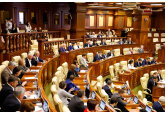
The decline in Moldova's GDP in 2022 will be 0.5%, and the average annual inflation in the country will be 30.3% - the National Institute for Economic Research forecast.
Such a forecast of experts from the National Institute for Economic Research is contained in the new quarterly issue of the publication "Trends in the Economy of Moldova" published by them on Tuesday. The publication contains data on the development of the socio-economic sphere at the global and national levels, as well as expert forecasts. The National Institute for Economic Research experts predict that this year investments in fixed assets in our country will decrease by 1.3%, exports will grow by 45.1%, and imports will increase by 27.1%. Production volumes in agriculture will decrease in current prices by 7%, and in industry - will decrease by 2%. Remittances from abroad will increase by 6.5%. Average annual inflation in the country will be 30.3%. The National Institute for Economic Research analysts explained that critical factors such as high prices and interest rates, modest domestic consumption and uncertainty caused by the war in Ukraine will contribute to the negative dynamics of fixed capital investment this year. In the long run, the modest evolution of investment is due to the structural weaknesses of the economy. At the same time, a significant increase in Moldovan exports will be provided mainly by the export and re-export of grain, sunflower seeds, sunflower oil, fuel; other export-oriented industries - the production of electrical equipment, clothing, furniture, shoes, etc. The National Institute for Economic Research experts point out that the Russian-Ukrainian war affects regional and world security; logistics networks are still fragile after the Covid-19 pandemic, and the Russian-Ukrainian conflict is creating additional pressure. Inflationary pressures continue to rise, in particular due to strong price movements in energy commodities and, to a lesser extent, in agri-food products. All this reduces the purchasing power of consumers, while also increasing the high vulnerability of low-income social strata. Representatives of the National Institute for Economic Research note the need to strengthen the policy of supporting socially vulnerable segments of the population in the face of a real decline in incomes of the population and a significant increase in the cost of goods and services with a high weight in the consumer basket. They recommend that the authorities monitor food security in the country and develop a new policy in this area due to the new external and internal economic situation influenced by the Covid-19 crisis, the war between Russia and Ukraine, as well as climate change. Experts also advocate ensuring the continuity of the implementation of structural reforms and increasing the productivity of enterprises; implementation of programs to support the business environment in order to reduce operating costs, facilitate access to financing at affordable prices, and enter new markets. They consider it necessary to ensure that trade policies are adjusted to increase resilience in order to reduce the cost of importing products, which is necessary to increase the competitiveness of the manufacturing sector, ensure the country's food security and diversify sources of supply and markets. Experts also consider it important to ensure the diversification of energy supply sources and stimulate efficient energy consumption by all categories of consumers: government agencies, enterprises, households. In addition, the National Institute for Economic Research representatives point to the need for a more efficient use of public money and external assistance to reduce structural constraints and restrictions associated with mitigating the effects of the pandemic and war.//25.10.2022 — InfoMarket.







